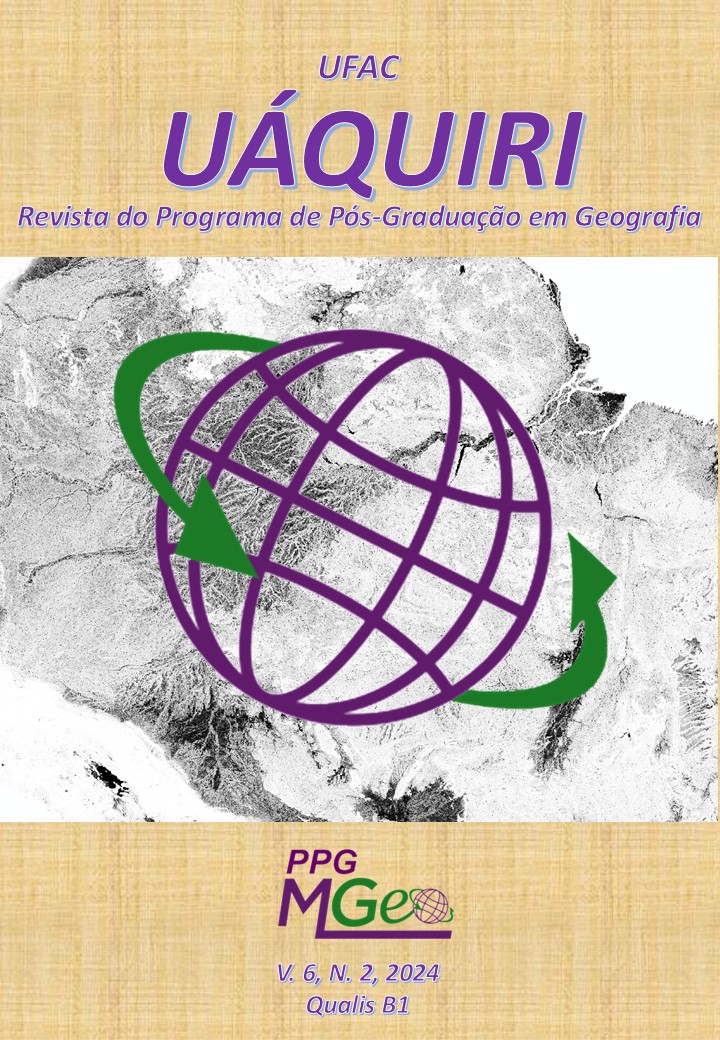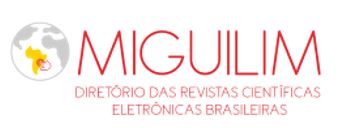“A SOCIEDADE DO RISCO”:
CONSIDERAÇÕES SOBRE O RISCO E A SUA GESTÃO À LUZ DA CIÊNCIA GEOGRÁFICA
DOI:
https://doi.org/10.29327/2151710.6.2-9Keywords:
Risk; Geography; Management; Society.Abstract
Contemporary society is marked by the rise of a fluid, digital and globalized world. According to the work of Urich Beck, this risk society is characterized by the construction of a chaotic, deregulated environment where risk has become a defining element of life. In this sense, this paper promotes a theoretical discussion on risk, relating it as a category of analysis in geography, highlighting in the same logic, conceptual and methodological elements for its management. It is believed that the geography of risk is constituted as a holistic and ethical intervention to understand and face contemporary challenges, highlighting the crucial role of the discipline in a society especially subject to uncertainty and chaos. By approaching risk as a category of geographical analysis, the article defends the need to integrate theoretical and practical processes to deal with risks and their impacts on society. Therefore, in the light of geographical science, risk management is defined as a set of actions and policies, involving public, private and social actors, which aim to mitigate or attenuate the effects caused by harmful events. Finally, the text shows how the dynamics of risk management take place in different regions, highlighting the correlation between socio-economic development, state structure and the ability to manage crises. It concludes that the geography of risk is consolidating itself as a response to the context of the risk society, and is an important agent in strengthening resilience and mitigating possible damage to populations.
Downloads
References
ACCASTELLO, C; COCUCCIONI, S; TEICH, M. The concept of risk and natural hazards. In: Protective Forests as Ecosystem-Based Solution for Disaster Risk Reduction (Eco-DRR). IntechOpen, 2021.
AVEN, T; RENN, O; ROSA, E. A. On the ontological status of the concept of risk. Safety Science, 2011, 49.8-9: 1074-1079. https://doi.org/10.1016/j.ssci.2011.04.015
BANKOFF, G. Rendering the world unsafe:‘vulnerability’as western discourse. Disasters, 25(1), 19-35. 2001. https://doi.org/10.1111/1467-7717.00159
BATTISTELLI, F; GALANTINO, M. G. Dangers, risks and threats: An alternative conceptualization to the catch-all concept of risk. Current Sociology, 2019, 67.1: 64-78. https://doi.org/10.1177/0011392118793675
BECK, U. " Momento cosmopolita" da sociedade de risco. ComCiência, 2008, 104: 0-0. Disponível em: (http://comciencia.scielo.br/scielo.php?script=sci_arttext&pid=S1519-76542008000700009&lng=pt&nrm=isso) Acesso: 12/12/2023
BECK, U. A metamorfose do mundo: novos conceitos para uma nova realidade. Editora Schwarcz-Companhia das Letras, 2018.
BECK, U. Ecological politics in an age of risk. John Wiley & Sons, 2018.
BECK, U. Sociedade de risco. São Paulo: Editora, 2010, 34: 49-53.
BECK, U. What is globalization? Cambridge: Polity Press, 2000.
BIRKMANN, J. Measuring vulnerability to promote disaster-resilient societies: Conceptual frameworks and definitions. Measuring vulnerability to natural hazards: Towards disaster resilient societies, 2006, 1.9: 3-7.
BIRKMANN, J. Risk and vulnerability indicators at different scales: Applicability, usefulness and policy implications. Environmental hazards, v. 7, n. 1, p. 20-31, 2007. https://doi.org/10.1016/j.envhaz.2007.04.002
BOHLE, H. G.; DOWNING, T. E.; WATTS, M. J. Climate change and social vulnerability: toward a sociology and geography of food insecurity. Global environmental change, v. 4, n. 1, p. 37-48, 1994. https://doi.org/10.1016/0959-3780(94)90020-5
BRADBURY, J. A. The policy implications of differing concepts of risk. Science, Technology, & Human Values, 1989, 14.4: 380-399. https://doi.org/10.1177/016224398901400404
CABRAL, L. S; CÂNDIDO, G. A. Urbanização, vulnerabilidade, resiliência: relações conceituais e compreensões de causa e efeito. urbe. Revista Brasileira de Gestão Urbana, 2019, 11: e20180063. https://doi.org/10.1590/2175-3369.011.002.AO08
CARDONA, O. D. Um sistema de indicadores para a gestão de riscos de desastres nas Américas. Measuring vulnerability to natural hazards — Towards disaster resilient societies (Sociedades resilientes a desastres), 2006.
CASTRO, I .E. “O problema da escala”. In: Castro, I. E. et al. (Orgs.) Geografia: conceitos e temas. Rio de Janeiro,Bertrand, 1995.
CUTTER, S. L. Urban risks and resilience. Urban informatics, 2021.
CUTTER, S. L. Vulnerability to environmental hazards. Progress in human geography, v. 20, n. 4, p. 529-539, 1996. https://doi.org/10.1177/030913259602000407
DRAXLER, J. Globalisation and Social Risk Management in Europea. Literature Review. 2012.
GALEANO, E. As veias abertas da América Latina. 12. Edição. São Paulo: L&PM, 1999.
GUIVANT, J. S. O legado de Ulrich Beck. Ambiente & Sociedade, 2016. https://doi.org/10.1590/1809-4422ASOC150001ExV1912016
HAMPEL, J. Different concepts of risk–A challenge for risk communication. International journal of medical microbiology, 2006, 296: 5-10. https://doi.org/10.1016/j.ijmm.2005.12.002
KOBIYAMA, M.; MENDONÇA, M.; MORENO, D.; MARCELINO, I.; MARCELINO, E.; GONÇALVES, E.; MOLLERI, G. Introdução à prevenção de desastres naturais. Florianópolis: GEDN/UFSC, 2004.
LIDSKOG, R; SUNDQVIST, G. Sociology of risk. In: Essentials of risk theory. Dordrecht: Springer Netherlands, 2012. p. 75-105.
MARANDOLA JR, E. HOGAN, D. J. Natural hazards: o estudo geográfico dos riscos e perigos. Ambiente&Sociedade. Vol. 7. N. 02. 2004. https://doi.org/10.1590/S1414-753X2004000200006
MENDES, J. M. Ulrich Beck: a imanência do social e a sociedade do risco. Análise Social, 2015, 214: 211-215. Disponível em: (https://scielo.pt/scielo.php?script=sci_arttext&pid=S0003-25732015000100012?script=sci_arttext&pid=S0003-25732015000100012) Acesso: 10/11/2023
MILETI, D. Disasters by design: A reassessment of natural hazards in the United States. Joseph Henry Press, 1999.
NASCIMENTO, A. S; ARAÚJOC. M. Narratives about natural risks and resilience in the construction of the global neoliberal urban agenda. Cadernos Metrópole, 2021, 23: 1135-1164. https://doi.org/10.1590/2236-9996.2021-5213
NORRIS, F. H.; STEVENS, S. P. Community resilience and the principles of mass trauma intervention. Psychiatry, 2007, 70.4: 320-328. https://doi.org/10.1521/psyc.2007.70.4.320
ORGANIZAÇÃO DAS NAÇÕES UNIDAS (ONU). Como construir cidades resilientes: um guia para gestores públicos locais. Genebra, 2012.
PAGETT, R. Principles Regarding Urbanisation, Disaster Risks Risks and Resilience. In: Handbook of Disaster Risk Reduction for Resilience: New Frameworks for Building Resilience to Disasters. Cham: Springer International Publishing, 2021. p. 57-77.
PEDROSA, A. S. O geógrafo como técnico fundamental no processo de gestão dos riscos naturais. Boletim Goiano de Geografia, [S.l.], v. 32, n. 1, p. 11-30, jun. 2012. Disponível em: (https://dialnet.unirioja.es/servlet/articulo?codigo=4785486) Acesso: 08/11/2023
PELLING, M. The vulnerability of cities: natural disasters and social resilience. Routledge, 2012. https://doi.org/10.4324/9781849773379
REITH, G. Uncertain times: the notion of ‘risk’and the development of modernity. Time & Society, 2004, 13.2-3: 383-402. https://doi.org/10.1177/0961463X04045672
RENN, O. Concepts of risk: a classification. 1992.
RENN, O. The role of risk perception for risk management. Reliability engineering & system Safety, 1998, 59.1: 49-62. https://doi.org/10.1016/S0951-8320(97)00119-1
SANTOS, M. Por uma outra globalização. Rio de Janeiro: Editora Record, 2008 (15ª edição)
SOUFI, H. Z; ESFAHANIPOUR, A; SHIRAZI, M. A. Risk reduction through enhancing risk management by resilience. International Journal of Disaster Risk Reduction, 2021, 64: 102497. https://doi.org/10.1016/j.ijdrr.2021.102497
VALÊNCIO, N. Desastres, Ordem Social e Planejamento em Defesa Civil: o contexto brasileiro. São Paulo: Saúde Soc., v.19, n.4, p.748-762, 2010.
VALÊNCIO, N. Sociologia dos desastres: construção, integração, interfaces e perspectivas no Brasil. São Carlos: Rima Editora, 2009.
VEYRET, Y. Os riscos: o homem como agressor e vítima do meio ambiente. Contexto. 2007.
VEYRET, Y; GARRY, G.; RICHEMOND, N. M. "Natural risks and development control in Europe: institutional structures, steps towards risk management and actors." Bulletin de l'Association de géographes français. 2004.
VEYRET, Y; REGHEZZA, M. "Hazards and Risks in Geographical Analysis". Anais de Minas. Vol.40. 2005.
VEYRET, Y; REGHEZZA-ZITT, M. "The Emergence of Risk in Geography". Cahiers nantais 64.1 (2005): 3-9.
YAMORI, K. Disaster risk sense in Japan and gaming approach to risk communication. International Journal of Mass Emergencies & Disasters, 2007, 25.2: 101-131. https://doi.org/10.1177/028072700702500201










